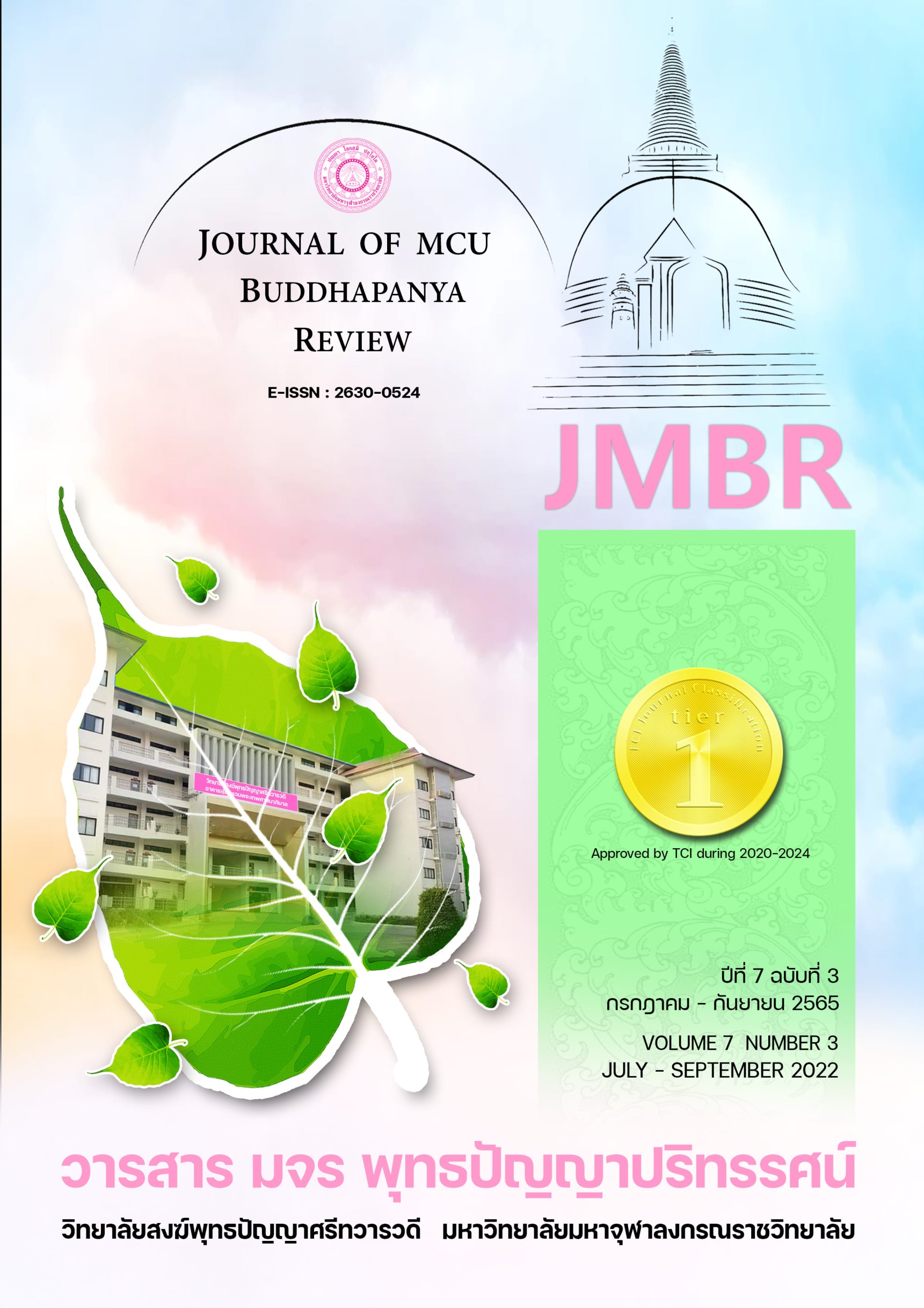การรู้เท่าทันสื่อด้วยพุทธิปัญญาสำหรับพระสงฆ์
คำสำคัญ:
การรู้เท่าทันสื่อ, พุทธปัญญา, พระสงฆ์บทคัดย่อ
การวิจัยครั้งนี้มีวัตถุประสงค์ 1) เพื่อพัฒนาชุดฝึกอบรมการรู้เท่าทันสื่อสำหรับพระสงฆ์ 2) เพื่อนำเสนอผลของการฝึกอบรมการรู้เท่าทันสื่อสำหรับพระสงฆ์ เป็นการวิจัยกึ่งทดลอง กลุ่มตัวอย่างเป็นพระสงฆ์ที่ศึกษาอยู่ในมหาวิทยาลัยมหาจุฬาลงกรณราช จำนวน 140 รูป แบ่งเป็นกลุ่มควบคุมและกลุ่มทดลอง กลุ่มละ 70 รูปด้วยวิธีสุ่มแบบจัดกลุ่มตัวอย่าง เครื่องมือที่ใช้ในการวิจัย คือ ชุดฝึกอบรมการรู้เท่าทันสื่อสำหรับพระสงฆ์ และแบบวัดการรู้เท่าทันทัน แบบวัดการเปลี่ยนแปลงพฤติกรรมการรู้เท่าทันสื่อ และแบบวัดการรู้เท่าทันสื่อชวนเชื่อทางศาสนา วิเคราะห์ข้อมูลใช้ค่าเฉลี่ย ค่าเบี่ยงเบนมาตรฐาน การทดสอบค่าสถิติ t-test Dependent Sample และ t-test Independent Sample
ผลการวิจัยพบว่า 1) ชุดฝึกอบรมการรู้เท่าทันสื่อสำหรับพระสงฆ์ สามารถพัฒนาความสามารถในการรู้เท่าทันสื่อของพระสงฆ์ให้สูงขึ้น 2) พระสงฆ์ที่เข้าร่วมกิจกรรมชุดฝึกอบรมการรู้เท่าทันสื่อสำหรับพระสงฆ์ หลังเข้าร่วมกิจกรรมสูงกว่าก่อนเข้าร่วมกิจกรรมอย่างมีนัยสำคัญทางสถิติที่ระดับ .05 3) หลังการทดลองพระสงฆ์ที่เข้าร่วมกิจกรรมชุดฝึกอบรมการรู้เท่าทันสื่อสำหรับพระสงฆ์มีความสามารถในการรู้เท่าทันสื่อของพระสงฆ์สูงขึ้น กลุ่มทดลอง และกลุ่มควบคุมมีความแตกต่างกันอย่างมีนัยสำคัญทางสถิติที่ระดับ .05
เอกสารอ้างอิง
Alicha Treerotchananon. (2019). Media Literacy of the Northern Region of Thailand. Journal of Mass Communication, 7(1), 1-24.
Bloom, B.S. Engelhart, M., Furst, E., Hill, W., & Krathwohl. D., Taxonomy of Educational
Objective: The classification of Educational Goals, Handbook I: Cognitive
Domain. (New York: Long Man Green, 1956.
Chintana Tansuwannond. (2008). Effects of Training on Media Literacy Development of Suan Dusit Rajabhat University Students, Journal of Behavioral Science, 14(1), 21-32.
Chintana Tansuwannond. (2010). Factors Related to Intellectual Media Consumption Behavior of Undergraduate Students in Bangkok, Journal of Behavioral Science, 16(1), 122-135.
Chintana Tansuwannond. (2020). Critical Thinking, Understanding and Collaboration, Creative Thinking, Media Literacy and Conducting Ethical Rules : Key Traits and Skill for Thai Youth in the 21st Century. Suratthani Rajabhat Jiurnal, 4(2), 1-20.
Dillon, J.T. 1984. Research on Questioning and Discussion. Educational Leadership, 42 (3), 50-56
Nattha Bangsuwanna. (2017). A Study of parents’ media literacy levels in smartphone and tablets usage behavior of early childhood. case study : a private school in Songkhla province. Master degree of Human Development. Mahidol University.
Nipinthon Srithon. (2005). Media Litteracy for Good Health in Child and Youth. Bangkok. Thai Health Promotion Foundation.
November.Johnson, David W. & Johnson, Roger T, Learning Together and Alone : Cooperative and Individualistic Learning. 4th ed. Boston : Allyn and Bacon, 1994.
Nunthika Nusom anw Virot Sutthisima. (2020). The Analysis of Fake News and The Level of Media Literacy of Users in Bangkok. Journal of Communication Arts, 37(1), 37-45.
Pathitta Rodprapan, Wichian Thamrongsotthisakul and Saifon Vibulrangson. (2016). Development of a youth Media Literacy Curriculum Based on Participation Learning for Junior Secondary School Students. Journal of Education Naresuan University, 18(4), 157-170.
Phra Brahmagunabhorn (P.A. Payutto). (2015). Buddhadhamma, Tha Laws of Nature and Their Benefits to Life. Buddhadhamma Foundation, Bangkok. 513-530.
Potter, W. James, Media Literacy,3rd.ed. California : Sage 1998
Rattanaponn Jommool. (2020). The Legal Measure to Regulate and Control Polotical Fake News on Cyberspace, CMU Journal of Law and Social Sciences, 13(1),1-23.
Tomorn Apiwanthanakorn. (2010). A Manual for organizing process and activities to develop youth media literacy. II, (Bangkok : Pinto Publishing).
Ven. Phradhammapitaka (P.A. Payutto). (2004). The holistic Development of Thai Youth. (Bangkok : Dhammasapa and Banluedhamm Institute), 34-35.
Ulichsa Krutthasan. (2013). The Development of the Media Literacy Learning’s Process Approach for the Youth Leader. Veridian E-Journal, 6(3), 276-285.
ดาวน์โหลด
เผยแพร่แล้ว
รูปแบบการอ้างอิง
ฉบับ
ประเภทบทความ
สัญญาอนุญาต
ลิขสิทธิ์ (c) 2022 วารสาร มจร พุทธปัญญาปริทรรศน์

อนุญาตภายใต้เงื่อนไข Creative Commons Attribution-NonCommercial-NoDerivatives 4.0 International License.



